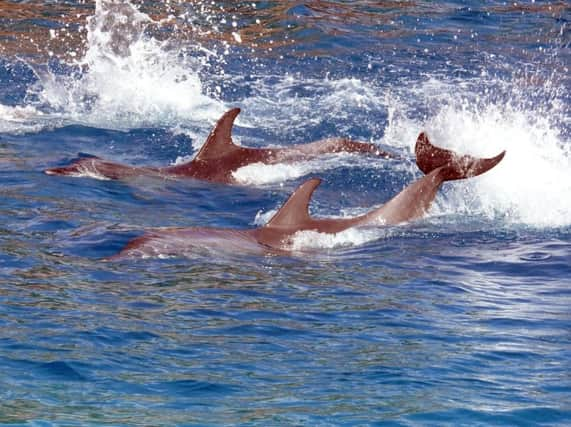Banned toxin curbs dolphin births in Scottish seas


Recent research has discovered high concentrations of polychlorinated biphenyls (PCBs) in the body fat of 329 harbour porpoises found stranded on UK beaches.
And the scientists leading the project said a population of bottle-nosed dolphins in the Moray Firth, which number around 200, have higher levels of PCBs than harbour porpoises.
Advertisement
Hide AdAdvertisement
Hide AdThey believe the chemicals, banned in the UK more than 30 years ago, may account for widespread evidence of stillbirths, miscarriages and spontaneous abortions among the females examined.
Almost a fifth of the sexually mature female porpoises bore signs of reproductive failure, said the experts.
A further 16.5 per cent had infections or tumours of reproductive organs that could have prevented them breeding.
A relatively low pregnancy rate of 50 per cent was also estimated for “healthy” females. Lead researcher Dr Sinead Murphy, from the Zoological Society of London, said: “Reproductive failure could have occurred in almost 40 per cent of mature females sampled in this study.
“PCBs may have reduced foetal or newborn survival, something which has also been observed in other mammals.
“UK harbour porpoises are part of a larger North-east Atlantic population and our research suggests a population-level risk from PCB exposure.”
PCBs were once widely used in electrical components and certain paints. Although banned, they are believed to persist in the environment for many years.
Previous research has shown the chemicals accumulate in the fatty tissue of whales, dolphins and porpoises where they can remain for a lifetime.
Advertisement
Hide AdAdvertisement
Hide AdHarbour porpoise calves inherit PCB contamination from their mothers through suckling.
The new findings are published in the online journal Public Library of Science ONE.
Co-author Dr Paul Jepson, lead veterinarian on the government-funded UK Cetacean Strandings Investigation Programme, said: “PCBs were banned in 1981 in the UK, but PCB concentrations only stopped declining in the blubber of UK harbour porpoises around 1998. PCB levels in many UK porpoises are still high, which could mean continued negative effects on health and breeding.
“The research concentrated mainly on strandings in England and Wales, but also included a number in Scotland. We have a paper to come out later in the year which also shows that the bottle-nosed dolphins in Scotland have higher PCB levels than the harbour porpoises.”